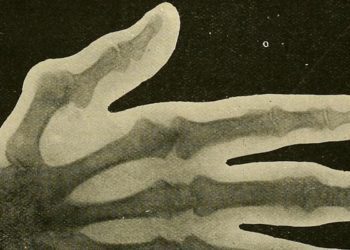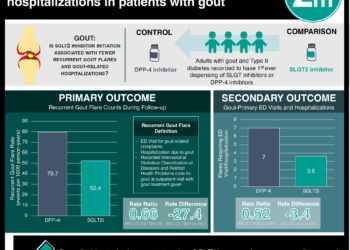ACP releases clinical practice guidelines for acute gout
1. Colchicine, non-steroidal anti-inflammatory drugs (NSAIDs), and corticosteroids were associated with reducing pain in patients with acute gout.
2. Urate-lowering therapies may lower long-term risk for acute gout attacks.
Evidence Rating Level: 1 (Excellent)
Study Rundown: Gout is one of the most painful forms of arthritis. It is caused by excess crystalized urate deposits in joint fluid, among other related sites, resulting in intermittent periods of synovitis. While gout typically results in acute periods of pain and joint swelling, for some patients, it develops into a chronic condition that can largely impede their lives. The authors of this study sought to review evidence regarding management of gout to prevent attacks in order to support the development of clinical practice guidelines. Collectively, they observed that colchicine, NSAIDs, and corticosteroids relieve pain in adults with acute gout. Furthermore, lower urate levels reduce the risk for recurrent acute gout attacks. This study has several limitations. First, there were no placebo-controlled trials of management of hyperuricemia that lasted longer than 6 months. In addition, only 10 studies clearly stated that patients came exclusively from primary care sites; therefore, the authors judged the evidence to only be moderately applicable to primary care. Overall, the results of this study may be used to form key guidelines to improve future management of gout.
Click to read the study in the Annals of Internal Medicine
Relevant Reading: 2016 updated EULAR evidence-based recommendations for the management of gout.
In-Depth [systematic review]: The authors followed the PRISMA (Preferred Reporting Items for Systematic reviews and Meta-Analyses) guidelines in designing their methodology. They searched for systematic reviews and original research studies in PubMed, EMBASE, the Cochrane Collaboration, and the Web of Science utilizing the terms “gout” and “gouty.” In total, 155 relevant articles were identified as meeting the inclusion criteria and were included for data analysis. As mentioned, a key finding of this systematic review is that there is high-strength evidence to suggest that colchicine, NSAIDs, and corticosteroids help reduce symptoms in patients with acute gout. In contrast, insufficient evidence was found to suggest that monitoring serum urate levels improves outcomes. Low-strength evidence also existed to support that treating to a specific target serum urate level would reduce the risk for gout attacks.
Image: CC/Wiki
©2016 2 Minute Medicine, Inc. All rights reserved. No works may be reproduced without expressed written consent from 2 Minute Medicine, Inc. Inquire about licensing here. No article should be construed as medical advice and is not intended as such by the authors or by 2 Minute Medicine, Inc.






